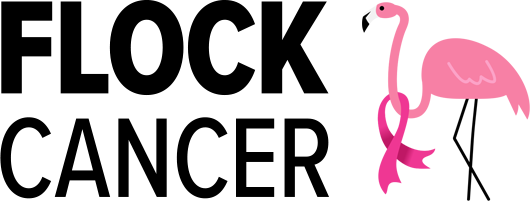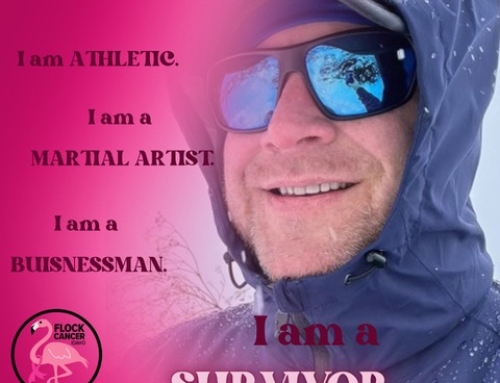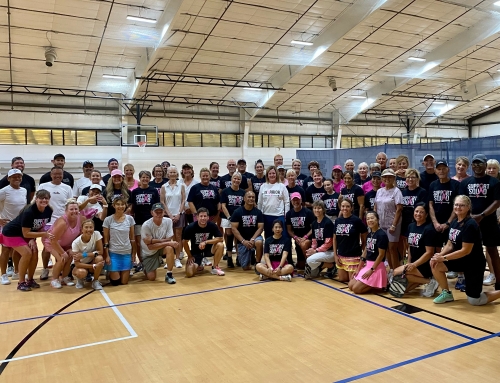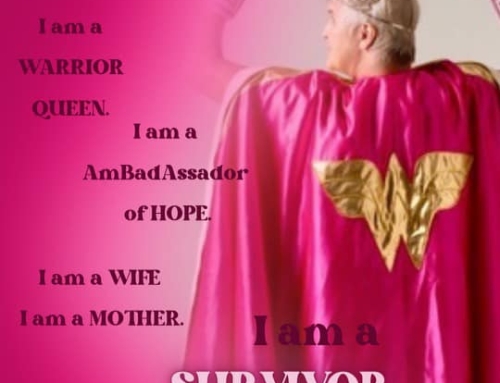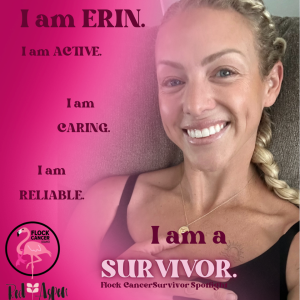
A Young Woman’s Journey with Breast Cancer.
Erin and her husband were ready to start a family. But they didn’t want to raise Children in Southern California where they were currently living, so, with friends’ and families’ advice and with a bit of research, they decided to move to the Treasure Valley. Within months of making the decision, Erin had lateralled to Meridian PD from Orange County, where she serves the community as a police officer. They made the move north and settled down in a home with a small acreage in Emmett. All was bliss. That was September of 2020 and in March of 2021, just six months later, she found a lump.
Departure Point, Diagnosis
Erin’s young with no history of breast cancer in her family, and she was in the best shape of her life. So, at 29 when her armpit began to feel sore from her police vest riding up, she performed a self-breast exam and noticed a bump. “I’m gonna pay attention to this. I had just moved. I didn’t have a doctor yet. So, I was like, okay, I am making an appointment with [a] primary care doctor. My husband and I had decided at that time we were going to start trying to build a family. And so I might as well just get my bloodwork done and all that stuff. Make sure we’re all good.”
She quickly found a PCP in her new community and toward the end of her first appointment, and almost as an aside, she showed her doctor her concern. “And so my doctor feels it and thankfully she did not slough it off because of my age and lack of family history. Because anyone else that I was telling was like, it’s gotta be a cyst, it’s got to be a fibrous, whatever, you know. And the doctor was like I don’t know, but let’s find out. So, thankfully, she did a great job and sent me to get an ultrasound.”
Erin knew something was awry when she saw the faces of the ultrasound technicians, “I guess it was so obvious to them that they were like, Honey, I think you need to prepare for bad news.” Erin went directly from the ultrasound to see a surgeon who explained the diagnosis and got her a biopsy. She did all this in one day. And, although the news wasn’t good, she had stage two cancer and it had infiltrated her lymph nodes, she felt some relief. She had answers and felt comforted that she had trusted her knowledge of her body and listened to her intuition; she knew something was wrong and it was confirmed.
Genetic testing was next. The initial thought was that Erin had HER2 Positive breast cancer because it was growing so rapidly, however genetic testing showed she had the CHEK2 gene mutation, a hormone positive cancer. Because the cancer is hormone-fed, treatment would require therapy to deplete her hormone reserves. Luckily, at this time her surgeon told her that if she wanted to preserve fertility, she would need to do IVF right away before the chemo destroyed her eggs. “That was probably the biggest shocker because I didn’t have any clue that chemo was gonna kill my eggs.”
Unplanned Detour, IVF
Erin wanted children and had no time to waste to get her eggs harvested before chemo started. They were able to retrieve numerous eggs and produce embryos which were then tested for her gene mutation because she didn’t want to pass it along to her children. (The CHEK2 gene mutation not only increases chances of a woman getting breast cancer, but also increases the possibility of colorectal and prostate cancer.) Thankfully, the clinic she went to gave her a 50% discount on the treatment as well as on the necessary prescriptions required because she had cancer. She also had a health savings account which came in handy at the time eith unplanned expenses. But money was the least of her worries, “I could never have a new car for the rest of my life if it means that one of my kids doesn’t have to go through this.”
Now it was time to begin her chemotherapy. Erin did sixteen rounds of chemo starting with four rounds of the “Red Devil,” a drug with renowned bad side effects which immediately dropped her into menopause. Then there’s the hair, “You’re worried about your hair falling out during chemotherapy and then you start menopause treatment and you’re like, okay, so my hair falls out doing this too.”
Hair Spared in Transit, Cold Capping
“I’ve had very thick, wavy, curly hair my whole life. And then also being young. Granted, I have a husband who’s amazing [and] I’m not worried about him leaving me over my hair. But, you know, we all know hair’s important, so I was like, well, I might as well try.” Through chemo and early menopause, Erin saved 80% of her hair because she cold capped. Her husband was dubbed the hair nurse and attended all her chemo appointments but one, when her dad showed up to fill in.
They literally froze her scalp for eightish hours each chemo day. “When I say froze my scalp, I mean like we had to get dry ice and it was negative 30 degrees Celsius.” She still has a few places on her scalp where you can see the ice burned, but she has her hair. “I mean, it felt so vain at the time. I’d be crying over my hair when I didn’t even know if I was gonna lose my life. You feel so silly. But this is something that I wanted to try to hold on to, like some sort of control, right? [It’s] something that’s gonna make me feel like me.” She even micro-bladed her eyebrows to maintain some sense of normalcy.
“So, I lost all of my body hair and still had my head hair. I was able to go to the grocery store when I felt like going to the grocery store and I was able to feel normal. And I didn’t have to hear, oh my gosh, you’re so young or you’re too young for cancer, you know, because that’s what I heard all the time. And I didn’t have to because no one had to know. Yeah, it was really nice. It was good for my mental health; I didn’t have to stay in a hole mentally if I didn’t want to.” “Sidenote, losing your nose hair. I’m not sure how much you know about it, but it is far more impactful than anybody says it is. You end up with like allergies up the ying yang.”
Frequent Flyer, Surgery
Chemo was followed by a double mastectomy with immediate reconstruction which wasn’t without its difficulty. To begin with, Erin didn’t have a say on the size or shape of the implants; after the surgery, they gave her the breasts that would fit considering the space and skin that was available. She was able to do a nipple-sparing which kept her healthy breast skin, nipples, and areola in place. Everyone thought she looked great, but she was in terrible pain. “I am sure it’s because they have to take every ounce of skin fat, like scrape you off, and then put in a foreign body and then like, go ahead, heal eight weeks after chemo.” Erin ended up having many issues after radiation and she was never pain free. “I was into fitness heavily before. I worked out through chemo; I was crazy about it. [But] I was in so much pain. I didn’t want to do anything.” “I knew I was going to end up with some chronic pain, but I didn’t expect it to be from my implants.”
So, Erin did a second reconstruction surgery after radiation. They did a lift on one side because of the effects of the radiation, then added cleavage using fat grafted from her body, “which hurt so bad. I did not expect it to hurt so bad, but it did.” Then, because her body promptly ate all the fat they had grafted, Erin was left with no cleavage, just pain. Her nipples hurt and the implants weren’t healing; the capsule was separating, and one of the implants was coming out.
Erin made the decision to ex-plant, remove the implants and the nipples, and become flat chested. She even took a friend to her next appointment and showed her surgeon her friend’s flat chest without nipples. But, when Erin woke up, she still had her painful nipples. “So anyways, that’s just a side note, but that’s why I had to have four surgeries, because I had nipple pain, right? So, I had to go back and have another one to have my nipples removed. And that’s the end of my surgeries.” Whew!
Debark for Radiation
27 rounds of radiation were sandwiched between Erin’s first and second surgeries in Nampa. It wasn’t the hardest thing she did during treatment, in fact, she liked the plan laid out by her oncologist. “It was like nice to see the same crew every day; I kind of felt at home and I think that’s part of it too. You feel comfortable and you feel safe because you have a plan and you’re doing the plan. You don’t realize how comforting that is even if it’s going to radiation every single day. You feel safe in your world of chaos at that time.”
But after the radiation, she was ready to be done. “I was exhausted. I was so tired. I had hit a wall at the end of treatment. I wanted it to be over. Like I hadn’t even really felt like I healed from chemo. I mean, I had chemo brain so bad. I don’t think radiation itself was hard. Like when I think of what the hardest thing was, it was definitely not radiation.”
After the radiation, Erin was tired, but she took a small vacation to celebrate. “I had kicked my own butt to try to live. I mean, when you’re 29 you’re like, oh my gosh, I might not reach my 30th birthday. How much have I not done?”
Stop Over, Hormone Treatment
“So, in the beginning, you know it was like, I know I’m going to do chemotherapy, I got this. I can do surgery, sure I got this. Radiation, alright, I got this, [this] should be the easy part. But hormone therapy is brutal! It’s not really something people talk about.”
Erin is young, she’s 32 now, but she continues to suppress the hormones in her body, so any remaining cancer has nothing to feed on. “I have to essentially shut my ovaries down and limit the amount of estrogen produced in my body, and I have to do it medically. So, I’m basically inducing menopause.” Enter hormone therapy and all the fun that comes with menopause. Normally for this type of cancer, women are on hormone blockers for about 5 years, but because she’s young it’ll probably be longer, just to be safe.
Connections En Route
Erin’s family has been there for her from the beginning. “My husband has been awesome! He’s the best for sure. My parents have been great. My in-laws have been great. I mean, honestly, we have a really, really great family.” But at the onset of this journey, when she was first diagnosed, Erin felt alone. She was 29 and in search of other 20–40-year-olds who were going through this. “I begged for support from my hospital, like begged. I’m not kidding you, I cried and begged. Like I need a therapist that knows how to deal with cancer. Or a support group.” But all support groups had been cancelled due to COVID and no one had any other suggestions for her. So, Erin set out in search of support.
She began by starting a blog where she detailed her journey. “I was vocal, it was almost like a little online journal throughout my treatment, like this is what I’m going through. This is where I’m at sometimes, this is where I’m at mentally.” “The more I shared, the more young people I started to meet, but when I was first diagnosed, I was alone.”
Erin joined a couple of Facebook support groups where she has met and followed other younger women with similar stories. “[I] connected with people that were like-minded and young and you know, I didn’t feel like I was the young person in the waiting room getting looked at weird.” She did find two excellent therapists, through recommendations from friends, which also helped her through the trauma.
“Honestly, [when] I think of going through treatment, the best thing, better than any therapist, is connection. Because even the best therapist will not be able to sympathize unless they’ve gone through cancer.” “So, I ended up finding a mentor. She was six months ahead of me in treatment. I talked to her daily through all of my stuff. It was really cool to have someone like that.” Then about six months later, Erin’s surgeon connected her to a young woman just starting treatment. Erin became her mentor and talked her through all of her own experiences. Erin became fast friends with both women, she now calls them her “breasties.”
“I was alone, and no one should have to feel like that, [but] once I found my network of people [it] was like, I’ve never felt that way again, and I’ve met some of my best friends through my cancer people.”
Itinerary For Other Young Women
Erin’s strongest advice for young women is to learn to do a self-breast exam. She learned the importance of the exam and how to do it in a women’s studies class in college. “There’s a misconception that if you don’t have the Braca gene and you’re young, you’re safe. Or [if] you don’t have a family history, and you’re young, you’re safe. Had I not done a breast exam…” “Know, know your body, know every nook and cranny, know what’s normal and what’s not normal, because the doctor is not going to know what lump is normal, what lump is growing…when a dimple appears that wasn’t there before…it’s really on us to know.”
Advocating for herself was something Erin learned to do during this trying time. “Advocate for yourself with your doctors. Know that there will always be pushback and insurance companies will always control the gist of what we get for our treatment, so we have to be smart.” Erin was prescribed a bagful of medications during her ordeal but questioned whether she needed all of them all the time. “I learned along the way, right? So, [they’re] giving me steroids every time I get chemo and I have to take [them] for five days and it makes me a monster; I’m going to eat everything and kill everyone in my house. Can I question what I’m taking?” She and her doctor discussed the importance of steroids in the healing process, but he agreed that she could decrease the amount she was taking if she would promise to start back up if she regretted it. She was successfully able to wean her steroids down to two days instead of five.* Getting a second opinion if it doesn’t feel right or finding a new doctor if you don’t connect are other ways Erin suggests you can advocate for yourself.
Arrival at Destination
Erin is home. She loves her home. She loves living and working in Idaho. She has great neighbors and workmates that have made her feel welcome and have become friends. “I [also] have houseguests, or like family groups, at my house, friends, etc., all the time. We kind of joke about me running a B&B kind of place where I have new guests just blowing through.” Best of all is that the IVF was successful; she and her husband have a beautiful four-month-old son. The journey, though tough, has been one of resilience and strength and perseverance culminating in love and joy.
* Always discuss the benefits and disadvantages of stopping a medication or treatment with your doctor before you do it.
